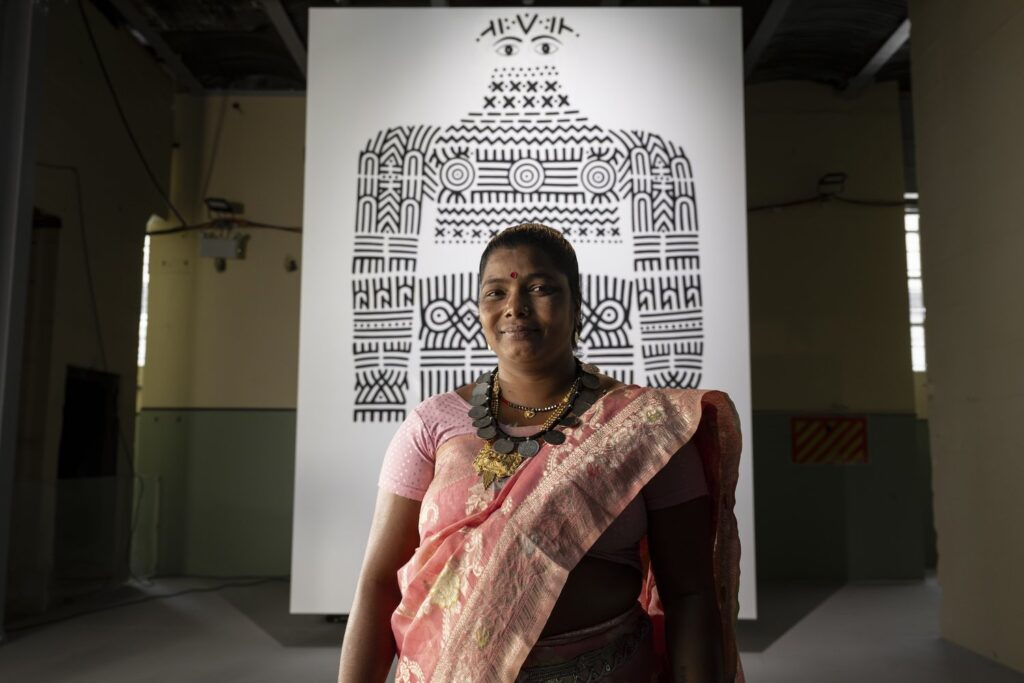In the quiet lanes of Lalpur, a remote tribal village in central India, the hum of needles and the rhythm of tradition still echo from a fading past. At the heart of this sound stands Mangala Bai, one of the last remaining Baiga tattoo artists, whose life’s work has become a battle against cultural erasure.
At a time when ancestral practices across India’s indigenous communities are disappearing, Mangala Bai is not only preserving an art form—she is safeguarding an identity.
Born into the Baiga tribe, a forest-dwelling Adivasi community in Madhya Pradesh, Mangala was raised in a household where the tattooing of women—called Godna—was both ritual and record. Each pattern etched into the skin told a story of belonging, spirituality, and survival. It was a map of one’s place in the world.
She began learning the art by watching her mother tattoo the village women. By the age of seven, Mangala was tattooing entire bodies. At eleven, she was representing Baiga art in national exhibitions. Today, she is bringing that tradition to the world—most recently through a global exhibition at the University of Sydney.
“When I bring this tradition to a global stage, I hope it will have the positive impact of making them proud of their identity,” she says, seated on a low stool outside her mud home.
But her quiet resolve masks a painful reality: the tradition she carries is vanishing in her own community.
A Legacy at Risk
Across Baiga settlements in Madhya Pradesh and Chhattisgarh, the number of young girls opting for traditional tattoos has sharply declined. Parents, afraid their children will be bullied in school or seen as primitive, increasingly discourage the practice. The urge to assimilate into mainstream society—driven by both aspiration and survival—has left traditions like Godna behind.
“Girls now want to look modern,” Mangala says. “They are ashamed of what once made us proud.”
There is no formal government support for her work. Mangala has never received a grant or even basic housing assistance, despite representing one of the few living links to an indigenous cultural practice. Her assistant, Amit Sharma, helps her document and teach the technique to a dwindling group of learners.
Without them, the tradition could end with her.
Beyond Aesthetic, A Mark of Being
Baiga tattoos are not decorative. Unlike modern body art, these tattoos are ritualistic, metaphysical, and collective. They mark life stages, spiritual beliefs, and relationships with nature. In Baiga belief, tattoos accompany the soul into the afterlife—they are the only possessions one can carry beyond death.
Each symbol—whether it be a scorpion, a tree, or a geometric pattern—embodies resilience and cosmology. “When the ink stops,” Mangala says, “the identity disappears.”
The Global Stage, The Local Fight
Mangala’s work has traveled farther than she ever imagined. Her participation in international exhibitions has brought attention to Baiga art among scholars, anthropologists, and collectors. But the irony persists: while the world admires her art, her own government remains indifferent.
In an era where tribal identity is often reduced to tourism brochures or handicraft fairs, Mangala’s tattoos represent something more enduring: a living, breathing act of cultural preservation.
Her mission is not about nostalgia—it’s about ensuring that future generations of Baiga children recognize the strength in their skin, not shame.
A Culture Etched in Flesh
As India continues its rapid economic and social transformation, traditions like Godna face a familiar threat: irrelevance. But for Mangala Bai, that is not a foregone conclusion. Every line she draws is an act of defiance. Every tattoo is a declaration that heritage matters—not in museums, but in the daily lives of those who inherit it.
She may be among the last, but she is not giving up.


